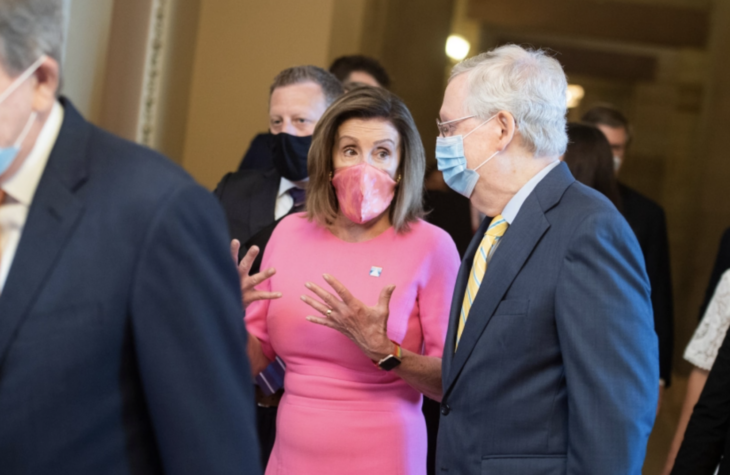
Primer: An Overview of the 2022 Omnibus Spending Bill
Summary
The House of Representatives passed the Consolidated Appropriations Act of 2022 on March 9, less than 24 hours after the finalized bill was revealed. Tallying 2,741 pages, the gargantuan “omnibus” was dropped on House members just hours before they were expected to vote. House leadership waived the rule requiring bill text to be finalized three calendar days before a vote is scheduled to ostensibly avoid a “government shutdown.”
Procedurally, House leadership used a rule to “divide the question” that split the legislation into two separate packages–one containing defense discretionary spending and one containing nondefense discretionary spending. The rule then cynically provided for the two separate packages to be merged together, ensuring its final passage while allowing partisans to claim they voted against the provisions unpopular with their respective political base.
Although the Congressional Budget Office has not yet issued a cost estimate, the House and Senate Appropriations Committees assert that the bill totals $1.5 trillion in spending, an increase of 6 percent over fiscal year 2021.
Aside from the astronomical cost–coming at a time when Americans are facing high inflation and skyrocketing gas prices–the legislation has myriad policy ramifications that will negatively impact the lives of hardworking taxpayers and citizens. Not least among these is the return of the inherently corrupt earmarking process, wherein lawmakers funnel taxpayer money to projects in their home districts or state to curry favor with well-connected special interests.
Key Details
There are many key provisions within the omnibus that reveal the disjointed priorities of Congress that will almost assuredly have a negative impact on millions of Americans. The first is the fact that a bipartisan, bicameral group resurrected earmarks–overturning an 11-year ban on the practice–and loaded the omnibus up with over 4,000 earmarks to hand-selected special interests. Aside from wasting large sums of taxpayer money, the return of earmarking guarantees a more corrupt legislative process wherein members essentially offer and accept taxpayer-funded bribes to curry favor with outside special interests that will both serve those interests and reward the member.
In total, the legislation increases spending by $88 billion over FY2021 levels, including a 6.7 percent increase in nondefense discretionary programs. This comes at the same time that inflation is at a 40-year-high of 7.9 percent.
Among the most stark spending increases are:
- A 10.4 percent increase ($11.3 billion) in Department of Health and Human Services spending above FY2021 levels, including a 6.8 percent increase in funding to the Centers for Disease Control and Prevention (CDC).
- A 10 percent increase ($989 million) in Department of Commerce spending above FY2021 levels.
- A 6.5 percent increase ($2.9 billion) in Department of Energy spending above FY2021 levels, including a record $3.2 billion for cost-increasing, unreliable clean energy initiatives.
- A 5.7 percent increase ($811 million) in Department of Treasury spending over FY2021 levels, including a 5.3 percent increase in funding for the Internal Revenue Service (IRS), the largest increase in over two decades.
- A 5 percent increase ($653 million) in Department of Labor spending over FY2021 levels, including a 3 percent increase in funding for the Occupational Safety and Health Administration (OSHA).
- A 4 percent increase ($1.4 billion) in both Department of Justice and Federal Bureau of Investigation (FBI) spending above FY2021 levels.
- A 3.8 percent increase ($2.9 billion) in Department of Education spending above FY2021 levels, including an 18 percent increase in CRT-derived Social and Emotional Learning (SEL) initiatives.
- A 3.4 percent increase ($323 million) in Environmental Protection Agency spending above FY2021 levels, including a 700 percent increase in so-called “environmental justice activities.”
Additionally, the legislation includes $286 million in funding for Title X “family planning” grants that will fund abortions through Planned Parenthood. The Biden Administration rescinded the Trump administration’s Protect Life rule on October 4, 2021, to specifically provide lawmakers a pathway to fund abortion providers through the appropriations process.
Additionally, the Biden administration reinstated federally-sponsored fetal tissue harvesting, removing ethics reviews for NIH grants that propose the use of fetal tissue for their research. The omnibus increases NIH funding by 5 percent from FY2021 spending levels.
The omnibus also reauthorizes the Violence Against Women Act (VAWA), which contrary to its name inflicts additional violence on women in two distinct ways:
1.) by opening the door for VAWA grants to abortion providers to carry out abortions as a “service” for survivors of sexual assault and rape; and
2.) by forcing battered women to share shelters with biological men who identify as women, which includes potentially sleeping next to and disrobing in front of men as part of VAWA’s expanded woke protocols.
The omnibus also includes $13.6 billion in emergency assistance to Ukraine–a last-minute addition following the Russian invasion in late February. Given the gravity of the events playing out in eastern Europe, this funding should have been a separate legislative package altogether so that lawmakers could debate the meaning and extent of American support for Ukraine.
Policy Ramifications
While the totality of the omnibus’ policy ramifications is unlikely to materialize immediately, there are some clear direct impacts that will harm Americans in new and continued ways. These include:
Higher Inflation: The bill increases base discretionary spending by 6 percent over FY2021 levels, fueling already record levels of inflation and accelerating the nation’s $30 trillion national debt.
Higher Energy Costs: The bill continues policies that will guarantee further pain at the gas pump through record spending for cost-increasing, unreliable green energy initiatives at the Department of Energy, Transportation, and Interior. Additionally, the bill makes no effort to restore the Keystone XL pipeline, deregulate onerous permitting requirements for domestic energy production, and unfreeze oil and gas development on federal lands.
Vaccine Mandates: The bill continues funding for destructive and unlawful vaccine mandates, including a 3 percent funding increase for OSHA after perpetuating their rule to force employers to force their employees to vaccinate or lose their job. The bill increases HHS funding by 10.4 percent after the department crafted a rule requiring frontline medical workers–doctors and nurses–to be vaccinated or lose their job.
Misinformation: The bill rewards the very agencies that misled the public on the efficacy of masks and issued public health guidelines based on political science instead of actual science. Specifically, the CDC receives a 6.8 percent funding increase to continue and expand their increasingly untrustworthy relationship with the public. The Food and Drug Administration (FDA) receives a 3 percent year-over-year funding increase despite stripping potentially life-saving alternative treatments from COVID patients.
Government Targeting: The bill rewards the increasingly corrupt FBI with a 4 percent funding increase after the agency explicitly targeted concerned parents at school board meetings as potential national security threats. The IRS, which is seeking to monitor the bank accounts of millions of Americans, received its largest funding increase since 2001 as part of the Biden administration’s designs to add 87,000 new agents to carry out pervasive monitoring of Americans.
Race Essentialism: The bill expands the federal government’s embrace of radical Critical Race Theory and its derivative ideologies like Social and Emotional Learning (SEL) with an 18 percent increase in SEL grants to foster the teaching of race essentialism to young children. Additionally, the omnibus allocates $235 million for apprenticeship programs that include grants to equity intermediaries which serve as little more than hired CRT-indoctrination consultants.
Foreign Security Threats: The bill perpetuates the Department of State’s authority to bring in additional Afghan refugees through the Special Immigrant Visa program, despite the known security threats posed by some who were evacuated in the wake of the Biden administration’s catastrophic withdrawal and the reality that the Taliban now controls the entire country.
Unsecured Southern Border: The omnibus appropriates a 3 percent funding increase for Border Patrol and a 3.5 percent increase for Immigration and Customs Enforcement, but makes no policy changes to those agencies’ current operating parameters. This increased funding will therefore result in additional personnel used solely for processing record numbers of illegal immigrants instead of detaining and enforcing the law to secure the southern border. The bill also explicitly leaves out funding support for the Remain in Mexico program and safe third-country asylum protocols.
While these ramifications are bad enough on their own, the full breadth and scope of the omnibus’ destructive impact on American workers, families, and struggling households remains to be seen.
Concluding Assessment
Given the legislation’s exorbitant price tag, restoration of corrupt earmarks, direct funding of agencies inflicting tyrannical mandates on American workers, direct funding of agencies targeting parents and taxpayers, and refusal to enact policies to protect Americans from higher inflation and higher energy costs, the bill is an unmitigated catastrophe.



